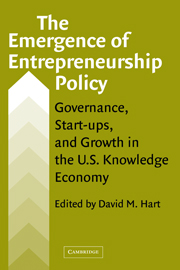 The Emergence of Entrepreneurship Policy
The Emergence of Entrepreneurship Policy Book contents
- Frontmatter
- Contents
- Editor's Acknowledgments
- Contributors
- PART ONE THE ENTREPRENEURIAL SOCIETY: WHAT'S GOVERNANCE GOT TO DO WITH IT?
- PART TWO HIGH-TECH ENTREPRENEURSHIP: THE UNIVERSITY-INDUSTRY-GOVERNMENT CONNECTION
- PART THREE EQUITY ISSUES IN ENTREPRENEURSHIP POLICY
- PART FOUR SECTOR-SPECIFIC ISSUES
- 9 Understanding Entrepreneurship in the U.S. Biotechnology Industry: Characteristics, Facilitating Factors, and Policy Challenges
- 10 E-Commerce, Entrepreneurship, and the Law: Reassessing a Relationship
- 11 Entrepreneurship and Government in Telecommunications
- PART FIVE IMPLEMENTING ENTREPRENEURSHIP POLICY
- Afterword
- References
- Index
9 - Understanding Entrepreneurship in the U.S. Biotechnology Industry: Characteristics, Facilitating Factors, and Policy Challenges
Published online by Cambridge University Press: 18 December 2009
- Frontmatter
- Contents
- Editor's Acknowledgments
- Contributors
- PART ONE THE ENTREPRENEURIAL SOCIETY: WHAT'S GOVERNANCE GOT TO DO WITH IT?
- PART TWO HIGH-TECH ENTREPRENEURSHIP: THE UNIVERSITY-INDUSTRY-GOVERNMENT CONNECTION
- PART THREE EQUITY ISSUES IN ENTREPRENEURSHIP POLICY
- PART FOUR SECTOR-SPECIFIC ISSUES
- 9 Understanding Entrepreneurship in the U.S. Biotechnology Industry: Characteristics, Facilitating Factors, and Policy Challenges
- 10 E-Commerce, Entrepreneurship, and the Law: Reassessing a Relationship
- 11 Entrepreneurship and Government in Telecommunications
- PART FIVE IMPLEMENTING ENTREPRENEURSHIP POLICY
- Afterword
- References
- Index
Summary
In his famous 1943 lecture “What Is Life,” the renowned physicist Erwin Schrödinger described human genes as “law code and executive power – or to use another simile, they are the architect's plan and the builder's code in one” (Zweiger 2001). Fifty-eight years later, in February 2001, both Nature and Science published draft versions of the complete human genome. This achievement is the latest revolutionary development associated with biotechnology. As an industry, biotechnology has experienced an almost continuous stream of scientific and technological advances creating new methods, tools, and information that have fueled dramatic progress in health care, agriculture, environmental cleanup, and criminal justice. Many policymakers are excited about these developments. They stand ready to assist entrepreneurs to cultivate and harvest the enormous returns that are expected to materialize.
The real challenge facing policymakers is to identify policies that effectively promote entrepreneurship in the biotechnology industry and nurture economic development. For a policy to be effective, it needs to be based on an understanding of the industry and its existing policy environment. However, on closer inspection, it quickly becomes clear that both of these are changing in complex and unpredictable ways. The extent and nature of commercial opportunities emerging as a result of the sequencing of the human genome are unknown and unpredictable. Today's policy environment involves a diverse array of institutions and organizations with wide-ranging agendas and divergent incentives, through which biotechnology entrepreneurs must navigate.
- Type
- Chapter
- Information
- The Emergence of Entrepreneurship PolicyGovernance, Start-Ups, and Growth in the U.S. Knowledge Economy, pp. 175 - 194Publisher: Cambridge University PressPrint publication year: 2003
- 3
- Cited by
